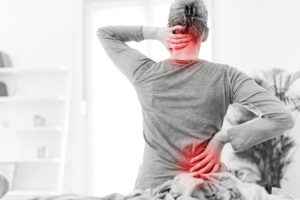Complex Regional Pain Syndrome

There are two ways medical malpractice may apply when a patient is suffering from CRPS. You may have been injured by a careless surgeon who caused nerve damage resulting in CRPS, or a doctor may have failed to investigate signs or symptoms of CRPS, resulting in a harmful treatment delay.
CRPS can happen anywhere in the body, but it most frequently affects the patient’s arm, leg, hand, or foot. Symptoms of advanced CRPS include:
- Chronic pain
- Atrophy
- Stiff muscles
- Deteriorating bones, skin, and muscles
- Hands, feet, and toes become stuck in a permanently fixed position
What Causes CRPS?
Complex Regional Pain Syndrome (CRPS) is a chronic neuro-inflammatory disorder that occurs when the patient’s nerve fibers aren’t functioning properly. CRPS is the result of improper pain signals being sent to the brain. When a patient is in the early stages of CRPS, the pain is usually much greater than any apparent medical condition.
A patient with CRPS usually begins to experience significant pain about four to six weeks after the event that causes nerve damage. That’s why it’s so important for doctors to make note of a patient’s medical history. CRPS may be triggered by the following:
- Falls
- Automobile crashes
- Sprains and bone fractures
- Surgical errors
- Strokes
- Heart attacks
Getting the Right CRPS Diagnosis in Time
In the early stages of CRPS, symptoms may include swollen joints, stiffness, muscle spasms, and throbbing pain. The affected area may change color and become extremely sensitive to the touch. You may have been harmed by a doctor who failed to thoroughly investigate your CRPS symptoms. There are several tests that doctors can provide to screen for CRPS, including:
- X-rays
- MRIs
- Blood tests
- Bone scans
- Sweat production tests
What Is Medical Malpractice?
Medical malpractice occurs when a healthcare professional deviates from the expected standards of their profession. If a reasonably competent doctor would have acted differently under the same circumstances, then it may be medical malpractice.
CRPS symptoms may be manageable when the doctor addresses the symptoms and orders the necessary tests. When the correct diagnosis is made, pain management can begin. Treatments that may reduce the severity of CRPS include:
- Nerve-blocking medications
- Physical and occupational therapy
- Bone-loss medications
- Intravenous ketamine
- Spinal cord stimulation
- Transcutaneous electrical nerve stimulation (TENS)
How Your Medical Malpractice Attorney Can Help
A CRPS malpractice injury lawyer can investigate the treatment you received by reviewing your medical records and interviewing the medical professionals involved. Then, your Denver medical malpractice attorney can file a claim or lawsuit against anyone whose negligent actions contributed to your injuries to help you receive the compensation you deserve. A medical malpractice claim for CRPS may include the following types of damages:
- Current and future medical treatment
- Pain and suffering
- Medications
- Lost wages
- Reduced quality of life
- Occupational therapy
- Hospital costs
- In-home nursing care
- Reduced earning potential
- Medical devices
Were You Injured by Medical Malpractice?
For over 40 years, Leventhal Puga Braley P.C. has been getting justice for people in Colorado injured by medical malpractice. The experienced trial attorneys at our Denver firm have been recognized by Avvo and Super Lawyers for providing clients with superior service.
Founding attorney Jim Leventhal was selected for membership to The Inner Circle of Advocates, an invitation-only group of less than 100 plaintiff lawyers in the U.S. who are renowned for outstanding courtroom achievement.
We stand committed to helping you get the resources you need. There is no charge for your initial consultation—call us at (303) 759-9945 today.